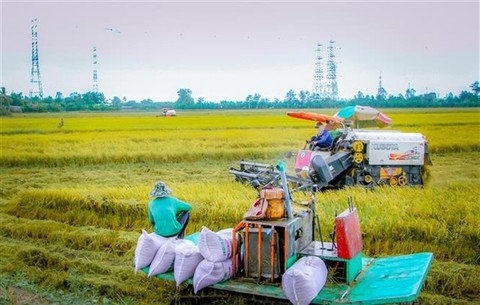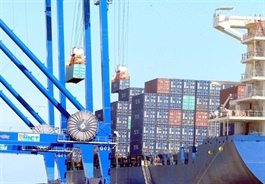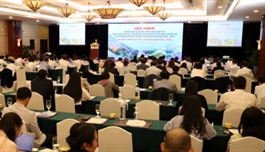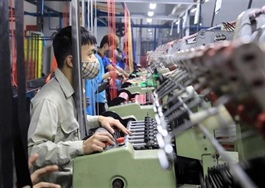Businesses hesitate to invest in the Mekong Delta region
Businesses hesitate to invest in the Mekong Delta region
The Mekong Delta region is a significant contributor to Việt Nam's agricultural exports, notably in rice, fruits, and seafood. However, investment attraction to this area remains disproportionate to its development potential.

Farmers harvesting rice in Cần Thơ Province, part of the Mekong Delta region. — VNA/VNS Photo |
Over the past ten years, total investment in the region has reached only about VNĐ202 trillion (US$8.6 billion), a figure considered too low for such a key economic zone.
According to a report by the Institute of Economics and Society of Cần Thơ City and the Việt Nam Chamber of Commerce and Industry (VCCI) Mekong Delta branch, total social investment capital in the Mekong Delta during 2015-2023 was the lowest in the country.
Foreign direct investment (FDI) in the region accounted for an average of only six per cent of the country's total FDI, primarily due to energy projects between 2019-2021. Notably, the agriculture, forestry and fisheries sector in the Mekong Delta has received virtually no FDI, posing challenges for industry development.
Director of VCCI Mekong Delta, Nguyễn Phương Lam, noted that although central government funds are being directed to the Mekong Delta, foreign and private investment has significantly decreased. He suggested that localities should prioritise disbursing public investment capital to support short-term development.
Over the longer term, the Mekong Delta needs to improve its business environment and enhance the effectiveness of investment projects to attract more FDI and private capital.
One of the major issues facing the Mekong Delta is an underdeveloped logistics infrastructure, which reduces its appeal to businesses. Lam emphasised that local authorities need to boost their image promotion and strengthen their branding to compete with other regions.
Deputy Director of the Department of Planning and Investment of Long An Province, Trần Văn Tươi, pointed out that geographical advantages and the planning of industrial zones have helped Long An attract more investors than other provinces in the Mekong Delta. Currently, Long An ranks third nationwide in attracting investment to industrial zones, following Bình Dương and Đồng Nai.
Tươi stressed that while investment in transportation and social and economic infrastructure is necessary, it is equally important for localities to excel in promotion, investment facilitation and business support. Factors such as improving the Provincial Competitiveness Index (PCI) and clear legal frameworks contribute to building investor confidence.
Director of the Institute of Economics and Society of Cần Thơ City, Nguyễn Khánh Tùng, believes that the lack of investment and inefficiency are the main reasons why the Mekong Delta is developing more slowly than other regions. To change this situation, efforts should focus on improving infrastructure—especially transportation and logistics—and promoting sectors like clean energy, the digital economy and industrial zones.
The report also highlighted that investing in multimodal transportation systems and inter-regional and international connectivity infrastructure will be crucial for driving future development in the Mekong Delta.
Although the Mekong Delta has significant potential, it faces considerable challenges in attracting investment. Localities must improve infrastructure, boost their image, and enhance management quality to establish sustainable development momentum for the region.



























